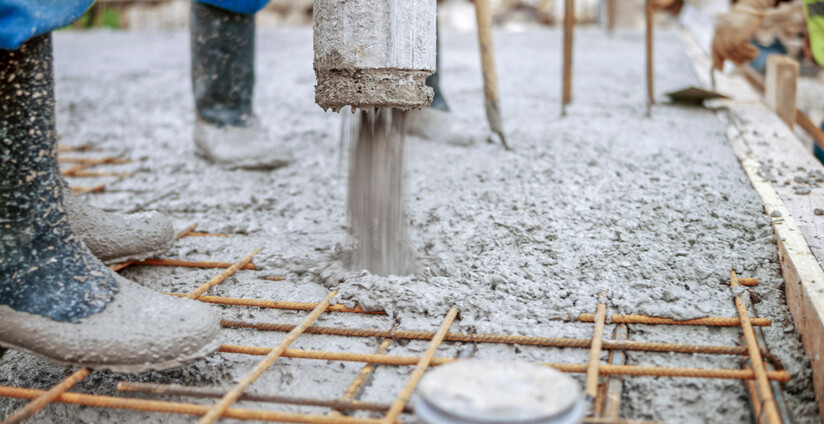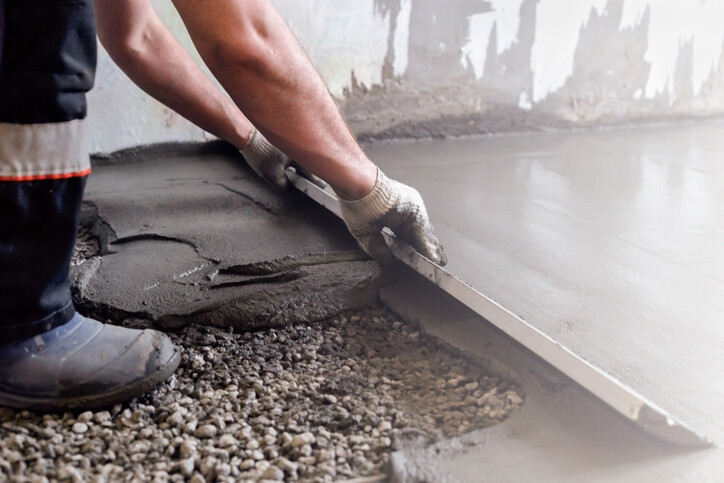 Concrete is a mixture of water, sand, cement and coarse aggregate, with proportions varying depending on the intended use. For example, mortar used primarily in bricklaying consists of cement, water and sand, with a higher ratio of cement to provide better adhesion. In contrast, concrete for house foundations, patios or driveways contains a greater proportion of sand and coarse aggregate: typically angular gravel that interlocks to add strength and durability.
Concrete is a mixture of water, sand, cement and coarse aggregate, with proportions varying depending on the intended use. For example, mortar used primarily in bricklaying consists of cement, water and sand, with a higher ratio of cement to provide better adhesion. In contrast, concrete for house foundations, patios or driveways contains a greater proportion of sand and coarse aggregate: typically angular gravel that interlocks to add strength and durability.
Concrete is most commonly poured into moulds or forms to create structures such as walls, foundations, stairs and slabs. To enhance its strength and prevent cracking, steel rods known as rebar are often embedded within the concrete to provide reinforcement and structural integrity. Cement acts as the key ingredient, functioning as an adhesive that binds the sand and aggregates together. Through a chemical reaction during curing, the mixture hardens into the solid material we recognise as concrete. Beyond structural applications, concrete can be moulded into artistic or decorative forms, such as coloured flagstones with natural-looking patterns.
Why Proper Planning is Essential for Concrete Projects
Working with concrete can be complex but, with the right tools and techniques, it becomes a manageable and rewarding process. Whether you're pouring a foundation, creating a smooth surface or breaking down old concrete, having the right equipment is crucial. At Paragon Tool Hire, we offer a wide range of concrete and compaction tools to make your job easier. Here are our top tips for working with concrete.
Step 1: Planning Your Concrete Project
Careful planning is the foundation of any successful concrete job. Begin by assessing your project’s requirements, including the volume of concrete needed, site preparation and any challenges such as accessibility or uneven ground.
Selecting the appropriate tools for your specific needs is just as important. For example, concrete mixers provide consistent and efficient mixing, saving time while ensuring quality. Our team can help you choose the right equipment to match your project.
Step 2: Compacting the Base for Durable Concrete
A durable concrete structure depends on a well-compacted base. Proper compaction prevents settling and cracking over time, ensuring long-term stability.
Paragon Tool Hire offers a variety of equipment to help you prepare the base effectively:
- Compactor plates: Versatile and reliable for general compaction tasks.
- Trench rammers: Ideal for compacting narrow trenches or confined spaces.
- Vibrating rollers: Suitable for larger areas requiring seamless compaction.
Ensuring a solid, compacted base is vital before you proceed to mixing and pouring concrete.
Step 3: Preparing and Mixing Concrete Properly
Achieving the right mix consistency is essential for strong, durable concrete. Using a dependable concrete mixer helps maintain uniformity and cuts down on labour, enabling you to focus on accurate application. Mixing in small, manageable batches is recommended to preserve quality and prevent the mix from setting too soon.
Step 4: Pouring and Consolidating Concrete to Avoid Air Pockets
Pouring concrete demands precision to avoid defects such as air pockets that compromise strength. A concrete poker is essential for vibrating the mix during pouring, ensuring it consolidates into a dense, void-free structure. This step significantly boosts the durability and integrity of your concrete work.
Step 5: Finishing Concrete Surfaces with Professional Tools
 The finishing stage defines the look and usability of your concrete. Whether smoothing, polishing or adding texture, the right tools make all the difference. Paragon Tool Hire supplies:
The finishing stage defines the look and usability of your concrete. Whether smoothing, polishing or adding texture, the right tools make all the difference. Paragon Tool Hire supplies:
- Concrete floats for levelling and smoothing surfaces.
- Concrete screeds for accurate levelling and a consistent finish.
- Petrol power floats ideal for larger projects requiring a professional-grade finish.
Always prioritise safety when using finishing tools to prevent accidental damage or injury.
Step 6: Breaking and Crushing Concrete for Recycling and Demolition
For demolition or recycling projects, having effective breaking and crushing equipment on site speeds up the process and reduces waste. The Komplet 12 tonne jaw crusher is perfect for on-site concrete recycling, converting debris into reusable material and cutting disposal costs. This is especially advantageous in urban areas or sites with limited space.
Essential Safety Tips for Working with Concrete
Safety must be at the forefront of all concrete operations. Always wear appropriate personal protective equipment (PPE), including gloves, goggles and masks, to guard against dust and chemical exposure. Follow the operating instructions for all hired equipment and keep your workspace tidy to reduce hazards and maintain a safe environment.
Why Hire Concrete and Compaction Tools from Paragon Tool Hire?
By choosing Paragon Tool Hire, you access a comprehensive selection of high-quality concrete and compaction tools, expert guidance and flexible hire terms. Whether you’re an experienced contractor or a DIY enthusiast, our equipment and support help you get the job done efficiently and effectively.
Speak to Paragon Tool Hire and Start Your Concrete Project with Confidence
Working with concrete need not be intimidating. With thorough preparation, the right tools and careful technique, you can achieve outstanding results. From mixers and compactors to finishing equipment and crushers, Paragon Tool Hire supplies everything required for success. Visit our website or call us on 01280 822282 to explore our range of equipment available for hire throughout Buckinghamshire. Hire from Paragon and get started on your next concrete project today.
